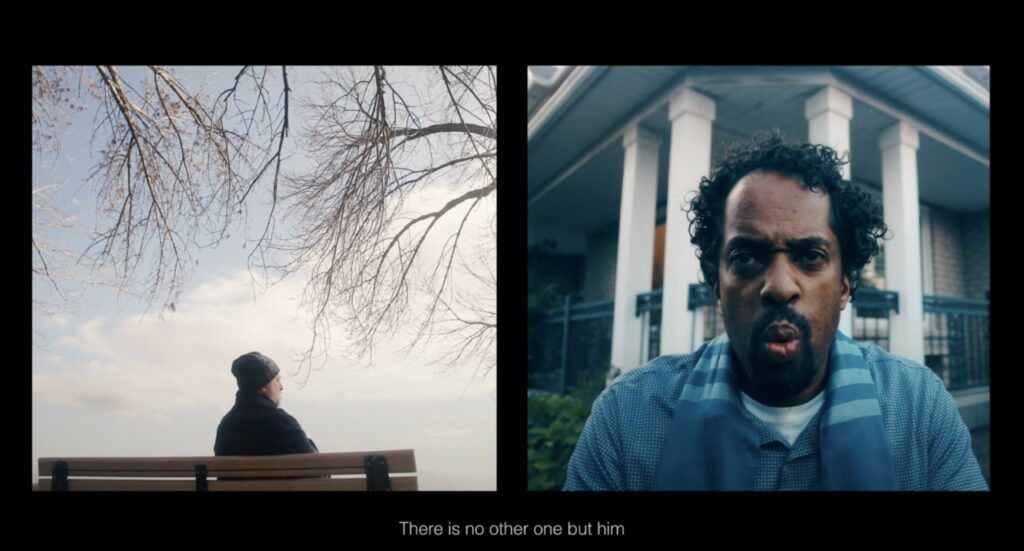
York University Associate Professor Zulfikar Hirji at the Department of Anthropology in the Faculty of Liberal Arts & Professional Studies is one of four life stories featured in the contemporary hybrid opera-film BOUND presented by Against the Grain Theatre (AtG).
Aiming to use the power of storytelling and music to address the many barriers Canadian newcomers and marginalized people face in their daily lives, the film questions “How welcoming are we as a country, as a city, as a community?”
BOUND’s libretto is written by AtG’s Founding Artistic Director Joel Ivany, whose lyrics explore social issues interwoven with the stories told by Hirji, Dr. Nadiya Vasdani, Cindy Rivers and Raina Younes who reflect on the challenging and different journeys they have endured to find their place and voice in Canada. Ivany is joined by Reneltta Arluk, director of Indigenous Arts, Banff Centre for Arts and Creativity as co-director.

Hirji immigrated to Canada from Uganda in the 1970s as a political refugee only to face the barriers of racism in his new homeland. This is the first time Hirji has shared his personal story with a large audience.
“A traumatic experience can’t necessarily be expressed in words,” he says. “There is a gap in research literature on how marginalized populations come to Canada and deal with the aftermath of their arrival, and I am at the age now to think it through and find the vocabulary to finally talk about it which I couldn’t do in the past. Watching what is happening in Canada today and seeing things we need to tackle as society and nation... I am in a place to give a voice and something someone who is just arriving might not be able to do. By providing language, vocabulary, the words, maybe others can find comfort that they are not alone.”
In the film, Hirji recalls being reminded by others at a young age that he was different or did not “fit in” because of his religious beliefs, traditions and life values. Facing aggression, violence and self-doubt, Hirji notes his story is similar to those who have also faced hardship because of their race, ethnicity, gender or sexuality and yet stories are unheard because they are not included or shared in Canadian studies and history curriculum or openly shared by those who have endured similar hardship along their journey.

In the film Hirji expresses, "when we came to Canada in 1972, I don’t think there was a vocabulary that we have today to speak about identity. Especially because I grew up in a small suburb in Vancouver, it was a pretty white place and I only realized that once someone started identifying me as not white, and that sort of identity became so fixed in my mind that I didn’t look like people around me at school and I didn’t speak the same languages and so I think all of the sudden you realize that you’re quite significantly different from the people around you and you have a different way of seeing the world than they do and I think that’s when you’re starting to question what your identity is.”
Telling these stories in the form of an opera-film provides an opportunity to reach an audience that may not particularly be speaking about these issues as traditional storytelling has been more commonly used in the past. Hirji collaborated with AtG over the past six years, sharing his research expertise as an anthropologist and social historian to assist the creative process. “I was actually quite surprised when they asked if I would tell my own story on screen,” he said. Hirji also mentions he uses the arts extensively in his anthropology courses throughout the years to help student explore complex social and cultural issues and consider new modalities through which to conduct, communicate and disseminate ethnographically grounded research.
“If we are going to make any impact, through research we have to be aware of ways in which people are absorbing information today and take it into consideration,” notes Hirji. “I intend to use BOUND in my graduate course in September and invite AtG to workshop ‘ethnographic-opera,’ an exciting new form of ethnography. If we want research to have longevity, we need to be aware of how we use new modalities to share our stories as they have resonance and are here to stay by experimenting and finding opportunities that are also respectful to academic research standards.”
Hirji also carries a musical background as a trained classical musician for 18 years. Tuned into AtG’s thinking, creativity and insight into questions related to Canada’s inclusivity, he expresses admiration for the artists who are using music to magnify sensory experience and emotions that cannot easily be conveyed through text alone.

BOUND composer Kevin Lau takes inspiration from George Frideric Handel’s music to create a score for the BOUND film anchored with assurance by the mighty sounds of the Toronto Symphony Orchestra, conducted by Nathan Brock to mirror the transformation of the four storytellers featured in the film.
The stories find life in song form through the singing of Juno-nominated soprano Miriam Khalil, tenor Andrew Haji, baritone Justin Welsh, and American trans woman and lyric soprano Breanna Sinclairé, who makes her Against the Grain Theatre and Canadian debut.
While the film is connected through themes of alienation, adaptation and transformation, it also offers a unique perspective of resilience, strength and hope, challenging Canada’s narrative as a welcoming nation that celebrates diversity.
Hirji notes that the University’s efforts in advancing equity, diversity and inclusion, also provides an opportunity for community support, which is more visible today than it was 15 years ago when he first arrived at York.
“I think now, we are in a place in the university setting, perhaps even nationally, to be able to voice these complex realities, and these factors that led me to talk about my personal story,” says Hirji.
BOUND will be streaming until April 24 and is free of charge. Registration is required.
Photos by Against the Grain Theatre's Dylan Toombs
